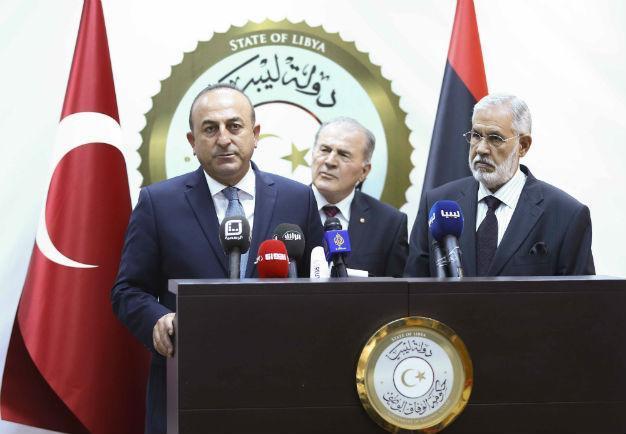Turkey and Libya agree on cooperation for joint projects: Sources
ANKARA

AA photo
Turkey and Libya’s National Consensus Government (NCG) have agreed on a joint understanding for the determination of the areas of solid cooperation between the two countries, during a visit by the former’s foreign minister.Turkish Foreign Minister Mevlüt Çavuşoğlu paid a one-day visit to Libya to issue an endorsement for a recently founded national government.
Çavuşoğlu met with Fayez al-Mustafa Sarraj, the head of the Presidential Council of the NCG, and the members of the council, during which they agreed on a joint understanding over the determination of areas for which concrete cooperation between the countries can be established, diplomatic sources said on condition of anonymity.
Both parties mentioned their will for the enhancement of relations between the two countries, while also agreeing to continue contacts between the sides for the fields of areas where Libya could make use of Turkey’s experience and expertise, the sources said.
Thus the initially preferred areas of cooperation for joint projects were defined as energy, air transport and infrastructure, they said.
Çavuşoğlu also separately met Tahir Siyala, the foreign minister of the new administration.
A package of 10 tons of humanitarian aid composed of food and medicine was extended to Libyan institutions on the sidelines of the visit. The package was prepared by the Turkish Red Crescent.
During the visit, Libyan authorities conveyed their will to Çavuşoğlu for the Turkish embassy in Tripoli to reopen. A technical delegation, which also includes many experts, accompanied the Turkish foreign minister on his visit in order to conduct onsite investigations on the possible reopening of the embassy, which had to be closed due to the deteriorating security conditions in the country in 2014.
Çavuşoğlu will travel to Rwanda following his talks in Libya.
Libya was sharply divided in the aftermath of the 2011 uprising that ousted Muammar Gadhafi, descending into growing instability that resulted in the creation of two main rival political groups, one in Tripoli and the other in Tobruk, as well as a statelet controlled by the Islamic State of Iraq and the Levant (ISIL). Intense U.N.-led efforts resulted in a political agreement in late 2015 as the basis of the NCG that began functioning on March 30.
















